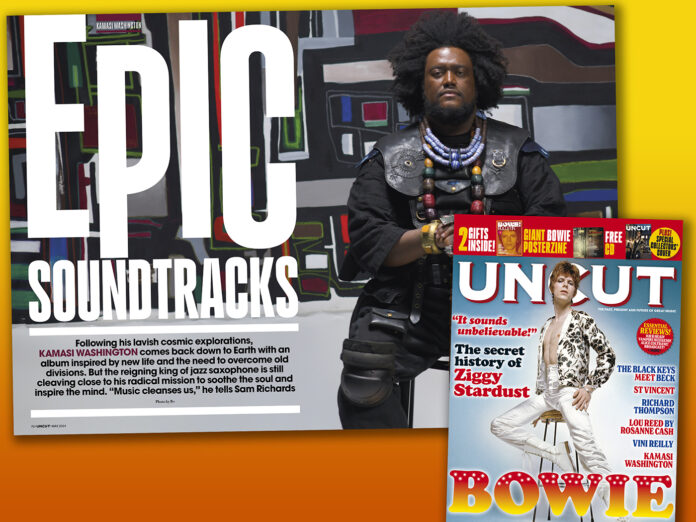In this month’s Uncut, we speak to the reigning king of jazz saxophone Kamasi Washington about how his upcoming album is inspired by new life and the need to overcome old divisions. "Music cleanses us," he explains.
In this month’s Uncut, we speak to the reigning king of jazz saxophone Kamasi Washington about how his upcoming album is inspired by new life and the need to overcome old divisions. “Music cleanses us,” he explains.
Now read on for an extract from our interview…
DAVID BOWIE IS ON THE COVER OF THE LATEST UNCUT – ORDER YOUR COPY HERE
Around midnight most evenings, Kamasi Washington will sit down at the piano in the living room of his home in Inglewood, Los Angeles, and begin to compose. Despite being synonymous with the saxophone, he only ever writes on piano, which goes some way towards explaining the harmonic richness of his music. “The piano is so much more versatile as far as being able to play the different parts and hear the song in its entirety,” he explains. “I played piano before I played saxophone, so it was always the logical choice. The saxophone is the racehorse, but the piano is the workhorse.”
He never tends to get much written during the day. “When the world gets quieter, it’s easier to focus. There’s rarely something I have to do at one in the morning.” But there’s another reason for his nocturnal schedule: lately his piano has been monopolised by a different, smaller pair of hands. Born during lockdown in 2020, his daughter has already shown aptitude for the family business, even writing one of the songs on his new album, Fearless Movement. “She’s very musical,” beams Washington. “She would get up every morning and go play piano. Sometimes she wouldn’t let me get on! Normally she’d play a bit more random, but one time she was playing this melody over and over again. Luckily, technology’s cool – pulled my phone out and recorded it. Then I started messin’ around with it, slowed it down, added some chords to it. And it made the record!”
The simple, rousing chorus of “Asha The First” – along with some funkier rhythms and a clutch of star cameos – helps to make Kamasi Washington’s fifth solo album his most accessible to date. But it’s still a lavish and expansive piece of work. Washington hasn’t become the most celebrated saxophonist of his generation by crossing over, dumbing down or condensing his vision into Spotify-sized snippets. Instead, he’s flourished as a radical maximalist, making music that’s vast in sound and scope, without losing sight of where he’s from. Indeed, at the heart of each record is the same tight-knit core of musicians, most of whom have been together since their teens, jamming in the garage between bouts of Street Fighter.
“I feel like his music reflects his personality,” says keyboardist Brandon Coleman, who first knew Washington as the lynchpin of South Central LA’s formidable multi-school jazz band, “comprised of all the baddest musicians in inner city schools.” Later they roomed together as students, playing church gigs on the weekend. “Kamasi’s one of the funniest people I know. He can talk to anybody about anything. He’s a genuine person, just a sincere individual. [With the music] his intentions are to create something magical, something unique. And he always stays true to that, even in moments where everyone else is trying to project another idea. He has a very clear stance on what he wants.”
“We end up having very ethereal conversations,” adds long-serving bassist Miles Mosley, another alumnus of the multi-school band. “Sometimes there are very high-level theory discussions about chord structures and harmonies. We will have a lunchbreak-length conversation about E flat minor 13 with the sharp 11! But generally speaking we’re looking for a feeling, and he’s looking for the sandbox to be right. We’ve been making music together for a long time, and he composes his music knowing the arsenal of players he’s going to have at his behest. So he derives a lot of joy from just seeing what happens.”
Read the full feature only in the latest edition of Uncut – in shops now and available to buy direct from us here
Mayday is released on May 3 via Young and can be pre-ordered here



